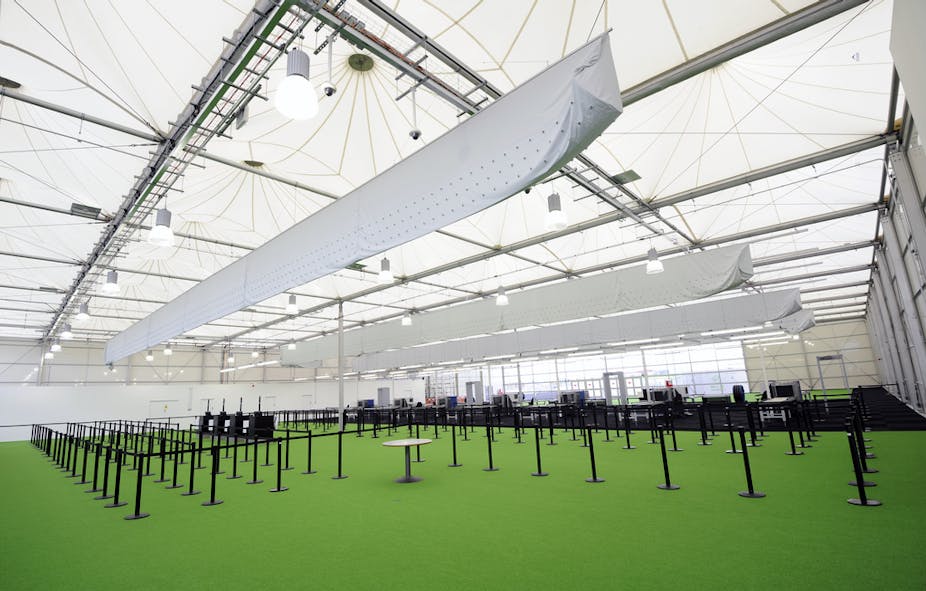The London 2012 Olympic and Paralympic Games are just around the corner, and promise to be a great global spectacle. At the same time, the organising committee are promising the most sustainable Olympics ever. Can this really be the case when so many people and so much building are involved?
Let’s talk numbers: 14,700 athletes, 25,000 members of the media, up to 70,000 Games Makers (volunteers), and countless administrators and officials will be in attendance. Nine million tickets for various sporting and cultural events are on sale, and a worldwide TV audience of up to 4 billion is predicted. In all senses of the word, these Games are going to be mega.
In events research, we use the term “mega events” to refer to events of a global size, scale and importance. There are only a few examples – Olympic Games, Commonwealth Games, FIFA Soccer World Cup, and World Fairs and Expos are really the only events with such global pulling power.
Mega events have in the past been the subject of much criticism for the perceived (and often real) negative and long-lasting impacts that they have on their host destinations. Perhaps the best known example is the Athens Olympics of 2004.
The environment bears the brunt of the negative impacts during the event. Major issues include the use of non-renewable resources; pollution of soil, air and water; and the generation of large amounts of waste.
However, since the 1990s, the International Olympic Committee (IOC) has been vocal in highlighting the importance of environmental sustainability to successful Olympic bids. Indeed, the IOC now considers the environment to be the third pillar of the Olympic movement, with sport and culture.

The London Organising Committee for the Olympic Games (LOCOG) has been working hard to prioritise the environment, and to go further than any previous Olympic Games. They are aiming to produce a zero carbon, zero waste event (on-site at least). By doing so, they hope to bring about long term environmental benefits to London long after the Games has finished.
The 2012 Olympics is also intended to be the first 100% public transport Games, with up to 800,000 people using the public transport network to access the Games venues on the busiest days. (This claim is making many Londoners think twice about travelling to work).
The LOCOG is the first Organising Committee to be certified to British Standard 8901(Specification for a Sustainability Management Systems for Events), and a Commission for Sustainable London has been set up for independent monitoring of the sustainability of the Games.
These efforts are laudable and will surely help to mitigate some of the negative impacts of the Olympics.
The conundrum is that the Olympic Games and other mega events are part of the problem, as well as trying to be part of the solution. London is expecting half a million overseas visitors this summer, twice the usual number. How can the event claim to be environmentally sustainable when it is the cause of around 250,000 extra passenger journeys, most of which will be air travel? It seems inherently unsustainable.
The environmental initiatives also seem localised to the host destination and limited to the duration of the event itself. For example, it is difficult to ascertain whether the carbon emissions calculations of the London Olympics include GHG emissions caused by the air travel of visitors to the UK. It seems that very little attention has been paid to the holistic global environmental consequences of this, or indeed any other mega events.

To take the argument to its logical conclusion, the only environmentally sustainable thing to do is not hold the event at all. Of course, this is not an option.
Better perhaps to look at how the Games can be used in a positive way by the host destination. The Olympic Games have a strong social component, allowing destinations to revitalise derelict and disadvantaged parts of the host city and create better infrastructure that remains as a legacy for those living there.
Mega events also offer an unrivalled opportunity to capture media attention – by promoting the Games as sustainable, LOCOG is arguably further normalising pro-environmental behaviour, and sending a strong message to the world about how seriously we should take environmental issues.
The Games are about a lot more than just the six weeks of competition. The definitions of sustainability (although complex and contested) include the notion of longevity – the Olympic Games, by their very definition as mega events, are one-off undertakings. They are not intended to sustain beyond the period of the event itself. Despite the best efforts of the LOCOG in attempting to minimise or mitigate negative environmental impacts, the Olympic Games are not truly green, and probably never will be.
But the real value of the Olympics and other mega-events may lie in the opportunity to leave a positive social legacy for the residents of the host city, while setting a strong (albeit imperfect) example for the rest of the world.

